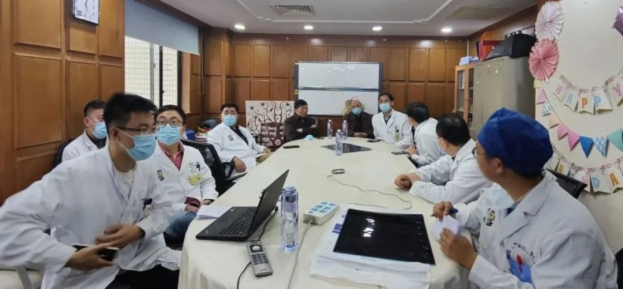- News
The Urology Department Team of the Urology Center at Shanghai General Hospital Treats Ultra Elderly Bladder Tumor Patients
Link of the original article:https://mp.weixin.qq.com/s/x0jNkTODBCTdsF1CjClRDQ
Recently, Prof.Wang Xiang, Director of the Urology Oncology Department (North) at the Urology Center of Shanghai General Hospital, treated a 97 year old patient with bladder tumor. The patient has now recovered and been discharged. Bladder tumor is one of the common malignant tumors of the urinary system. Transurethral resection of bladder tumor is also a mature technology in our hospital, but it is the first case for 97 ultra elderly patients to perform surgery in our hospital.

Grandma Sun suddenly developed gross hematuria in October last year and was diagnosed with bladder space occupying lesion in an external hospital. Due to her concurrent presence of hypertrophic obstructive cardiomyopathy and significant left ventricular outflow tract pressure difference, the surgical risk is extremely high. Therefore, the family has temporarily chosen conservative treatment. In March of this year, Grandma Sun once again experienced gross hematuria and was diagnosed with multiple bladder masses in an emergency department at an external hospital, considering malignant tumors. Grandma Sun and her family went to several hospitals and answered "the surgery is very difficult and risky."
Long term illness and torment have caused Grandma Sun's body to deteriorate. With the last hope, my family brought Grandma Sun to the urology oncology department of our hospital's urology center for help. Upon learning of such an elderly patient, Prof.Wang Xiang, director of the Urology Oncology Department (North) of our urology center, immediately opened the green channel and arranged for Grandma Sun to be admitted to the ward.
Due to long-term hematuria and blood loss, Grandma Sun had only 60g of hemoglobin upon admission. The urology oncology team urgently provided targeted treatment such as blood transfusion, continuous bladder flushing, and nutritional support. Subsequently, the treatment team conducted a comprehensive examination for Grandma Sun and organized a large-scale discussion of difficult cases in the hospital to carefully explore and study the treatment plan.
At first, the treatment team considered that Grandma Sun's condition had only slightly improved after targeted treatment, and at this point, the risk of undergoing surgery directly was higher. After communicating with the family about the treatment plan, the treatment team performed internal iliac artery cannulation and chemoembolization for the patient under anesthesia. Although there was a decrease in postoperative hematuria compared to before, the hemoglobin still showed a progressive decrease, and the treatment team provided symptomatic treatment with blood transfusion again.
After comprehensive evaluation by the treatment team after interventional embolization therapy, surgical resection is still the best option for radical treatment of bladder tumors. The patient's weak physical condition became the biggest obstacle to the surgery. The treatment team conducted strict clinical examinations for Grandma Sun, communicated with the patient's family several times, and organized discussions on the case again. The team collaborated with experts from the Anesthesiology Department and Emergency Critical Care Department to conduct a comprehensive evaluation of Grandma Sun's condition, formulated a thorough surgical treatment plan, envisioned various unexpected situations that may occur during the surgery, and deduced response measures.
On the day of the surgery, Prof. Wang Xiang performed transurethral resection of bladder tumors under general anesthesia for Grandma Sun. During the surgery, it was found that the patient's bladder was almost filled with tumors. The surgical team removed multiple tumors in the bladder in the shortest possible time, achieving a balance between surgical efficacy and postoperative safety. After surgery,Grandma Sun's hematuria, which had been bothering her for several days, has been resolved.Because Grandma Sun is old and her heart function is poor, she needs to closely monitor the signs and conduct various catheter care after the operation, as well as prevent postoperative complications such as pneumonia, lower limb deep vein thrombosis and pressure sore. The nursing requirements are very high. Under the meticulous care of the nursing team led by head nurse Lin Lin, Grandma Sun recovered well after surgery, with significant relief in hematuria and normal hemoglobin levels, avoiding postoperative complications. She has now recovered and been discharged from the hospital.
Correspondent/Urology Center Shao Jialiang, Zhang Encheng
